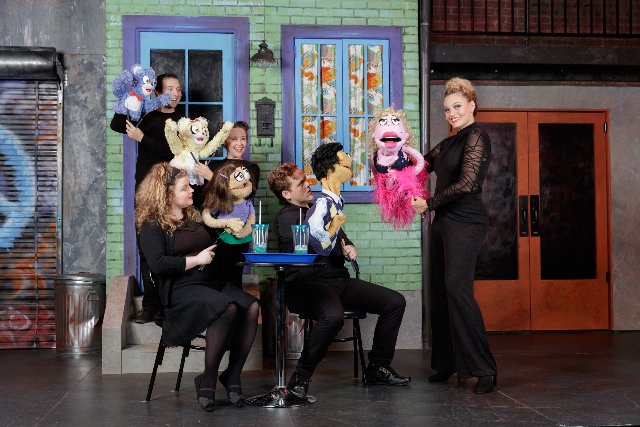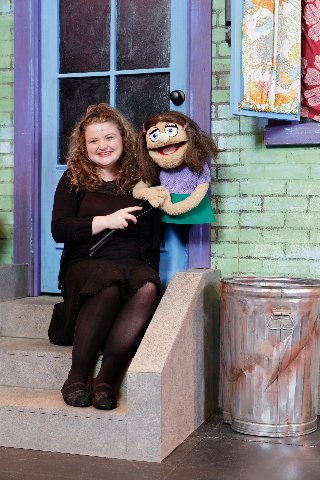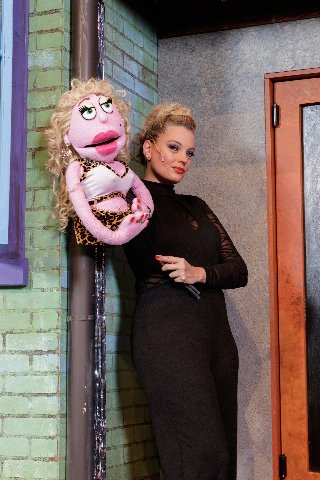Avenue Q in Southern Florida
Potty Mouthed Puppet Show at MNM Theatre Company
By: Aaron Krause - May 28, 2018
As most musical theater aficionados are aware, there are plenty of words in the potty-mouthed puppet musical Avenue Q that might cause you to recoil.
But in today’s economically, politically and socially-troubled times, four refreshing words in the satiric show are especially most welcome. They can produce the calming effect of a few, slow deep breaths.
Those words, “But Only For Now,” are lyrics in the reassuring song “For Now." The performers sing it at the show's ending.
But the nonprofit MNM Theatre Company’s playful, buoyant production, running through June 10 in West Palm Beach, is slightly different from the early 2000s Broadway mounting of this tongue-in-cheek parable addressing the anxiety associated with the beginning of adulthood.
With MNM’s take, Avenue Q, a puppet show for mature audiences, has joined the legions of stage shows that have mentioned Donald Trump. There is also a reference to Melania.
Trump is our president, to paraphrase slightly-revised lyrics. “But only for now,” the actors continue singing. During the reviewed performance, some audience members cheered. Some may voice an entirely different reaction.
Hey, nobody ever said Avenue Q leaves us holding hands and singing “Kumbaya.” This provocative show stings and soothes our sensibilities, makes us laugh and squirm (sometimes at the same time) and can deceive.
This is, after all, a musical puppet show. However, please don’t take children. This is not a children’s show. It includes vulgarities and a character named Lucy the Slut. A sexy, seductive Nicole Piro plays her.
While Avenue Q parodies and shares similarities with children’s television shows, it also calls to mind South Park. And Robert Lopez, one half of Avenue Q's music and lyrics team, co-created the also unabashedly offensive, yet hilarious musical The Book of Mormon.
While Avenue Q contains a few religious references, this 2004 winner of the Tony Award Triple Crown for Best Musical, Best Score and Best Book doesn’t preach. Sure, the musical forces us to look inward and recognize that nobody’s perfect.
We, ourselves, might be too willing to serve as "puppets" of people recognizing our weaknesses and eager to pull our strings for their own twisted causes.
Inherently, meanwhile, “Everyone’s a little bit racist,” the show’s creators remind us. But the song contains a melody that is carefree and non-judgmental. While it doesn’t condone racism, it essentially tells us to relax; we’re too hard on ourselves sometimes.
A fine cast deftly, backed by an energetic live orchestra, captures the tone to this and other songs, while creating convincing characters with distinct personalities. The performers also prove adept at using puppets. They talk, dance and sing the mood-contrasting, catchy songs while moving the puppets’ mouths in impressive synchronicity.
One of this show’s pleasant surprises is that there’s no effort to conceal the actors. We clearly see them operating the puppets. However, we suspend our disbelief because this musical—and this production of it – is so endearing. Besides, seeing unconcealed people puts human faces on the issues.
Avenue Q, which has its heart in the right place, has remained popular and successful for a number of reasons. One is that it allows us to ponder social issues and problems relevant to us as adults in a playful manner that recollects our childhood. Surely most of us recall watching Sesame Street. While watching, we learned about simple topics reinforced in our early school days.
MNM Theatre’s production calls to mind the program with a projector screen. Images and characters appear on it. During one scene, a voice sounds out the word “Purpose.” It’s as though we’re learning it as a vocabulary word. This directorial choice marries our recollection of Sesame Street with a concept all adults must address. After all, who doesn’t need a purpose in life? Attaining one is the main objective of Princeton. He's a fresh-faced recent college graduate.
Wesley Slade, a strong voiced and award-winning actor, possesses telling facial expressions. He’s able to seamlessly switch from one to another, strongly suggesting gloominess or happiness. Moreover, Slade’s boyish demeanor makes Princeton sweet and likeable. If this talented actor were to add a bit more subtlety to the mix, his performance would be even stronger.
Slade’s castmates also deliver strong performances. That is especially true for a bubbly, enthusiastic and ambitious Kate Ryan as Kate Monster with a purpose of her own. She’s the more tamer of the show’s two creatures. The other is Trekkie Monster (a scratchy-voiced Paul Louis). Trekkie is a Cookie Monster-like character who makes us laugh while reminding us that we all don’t use the Internet for the purest of purposes.
Trekkie’s not the brightest of the bunch, and neither is a therapist named Christmas Eve, a stereotypical Asian young woman with broken English who’s not above stereotyping herself. Jane Ng displays excellent comic timing as the character, whose words remind us that we all are guilty of overgeneralizing about people based on their race, class, sexual preference, etc.
Rod hardly fits a gay stereotype. He is also clearly uncomfortable with his own sexual orientation. Michael Scott Ross invests him with palpable tension and irritability. The character reminds us that as many strides as we’ve made toward accepting members of the LGBQT community, some may still feel uncomfortable coming out. That’s especially true in our political climate.
Other issues the show raises, such as Schadenfreude, further awakens us to an uncomfortable reality.
Indeed, we have a long way to go before we’re fully accepting of others. By the way, Schadenfreude refers to finding joy in other people’s pain.
Rather than taking part in such a hurtful action, why not help others? “The Money Song” is an upbeat number which sends positive vibes throughout the theater. In this production, director Linser breaks the “Fourth Wall.” As they sing, the actors enter the audience seating area with donation buckets (no pressure whatsoever), enthusiastically encouraging us to be charitable.
“When you help others, you can’t help helping yourself!,” the song ends.
This cast convincingly creates a sense of a neighborhood community. Its members, some puppets, some humans, live on Avenue Q. It’s a New York City street in an “outer-outer borough." As one call tell from its appearance, it's just affordable enough for many just beginning adult life on their own.
Scenic designer Daniel Porten renders the run-down Avenue Q in a colorfully cartoonish, yet somewhat dilapidated manner. The neighborhood might be a fictional place. However, it can also symbolize the characters’ life situation -- a first taste of the "Real World" for many.
Suddenly, these folks are no longer within the “safe,” confines of college, where people still provide for them. They’re on their own, faced with problems, identity crises and other issues. In other words, reality is staring them in the face and they’re receiving a lesson in real-life living. Their options are limited – as is the case with so many people in today’s world.
But as down as these folks have seemed, at the show's end they appear to have discovered an indomitability they never knew they had.
“Avenue Q” will last, they believe, “Only for Now.”
Avenue Q runs through June 10 at Raymond F. Kravis Center for the Performing Arts' Rinker Playhouse, 701 Okeechobee Blvd. in West Palm Beach. For ticket information and show times, call (561) 832-7469 or visit www.mnmtheatre.org.



